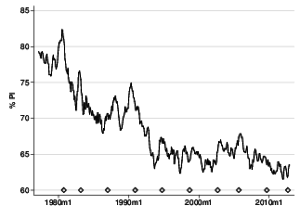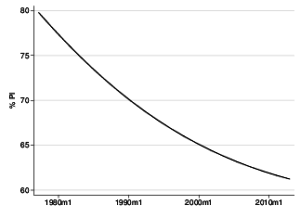Update
- Arzheimer, Kai. “Another Dog that did not Bark? Less Dealignment and More Partisanship in the 2013 Bundestag Election.” German Politics 26.1 (2017): 49-64. doi:10.1080/09644008.2016.1266481
[BibTeX] [Abstract] [HTML]Using new data for the 1977-2012 period, this article shows that dealignment has halted during the last decade amongst older and better educated West German voters, and that party identification is now more widespread than it was in the 1990s in the east. For voters who identified with one of the relevant parties at the time of the 2013 election, their vote choice was more or less a foregone conclusion, as candidates and issues played only a minor role for this group. A detailed analysis of leftist voters shows that supporters of the Greens, the Left, and the SPD have broadly similar preferences but diverging partisan identities. Even amongst western voters of the Left, most respondents claim to be identifiers. This suggests that the fragmentation of the left is entrenched, and that ‘agenda’ policies have triggered a realignment.
@Article{arzheimer-2017b, author = {Arzheimer, Kai}, title = {Another Dog that did not Bark? Less Dealignment and More Partisanship in the 2013 Bundestag Election}, journal = {German Politics}, keywords = {gp-e, attitudes-e}, year = 2017, pages = {49-64}, volume = {26}, html = {https://www.kai-arzheimer.com/paper/another-dog-that-didnt-bark-partisan-de-alignment-and-voting-in-the-2013-election/}, number = {1}, abstract = {Using new data for the 1977-2012 period, this article shows that dealignment has halted during the last decade amongst older and better educated West German voters, and that party identification is now more widespread than it was in the 1990s in the east. For voters who identified with one of the relevant parties at the time of the 2013 election, their vote choice was more or less a foregone conclusion, as candidates and issues played only a minor role for this group. A detailed analysis of leftist voters shows that supporters of the Greens, the Left, and the SPD have broadly similar preferences but diverging partisan identities. Even amongst western voters of the Left, most respondents claim to be identifiers. This suggests that the fragmentation of the left is entrenched, and that ‘agenda’ policies have triggered a realignment.}, doi = {10.1080/09644008.2016.1266481}, }
Original 2015 post
Almost a decade ago, I published an article with a cutesy title on the decline of party identification in Germany, of which I am inordinately proud. The main message of this piece was that party identification in Germany has not collapsed, but is rather declining at the glacial rate of 0.7 percentage points per year, give or take. Here is the relevant graph:

For a more recent project, I have extended the time-series to cover the whole 1977-2012 period, right up to the start of the 2013 federal election campaign. As it turns out, de-alignment in the West has come to a virtual halt during the last decade – see here:

If you think that this is still too noisy, have a look at this trajectory, which is derived from a binary logistic model that regresses identifications on time, age, education, and campaign effects. More on this soon.

Discover more from kai arzheimer
Subscribe to get the latest posts sent to your email.

RT @kai_arzheimer: Party Identification in Germany: Not Dead Yet
https://t.co/U8F1lAkASY https://t.co/H90r6qMnIb
RT @kai_arzheimer: Party Identification in Germany: Not Dead Yet
https://t.co/U8F1lAkASY https://t.co/H90r6qMnIb
Party Identification in Germany: Not Dead Yet (1) https://t.co/GZIIA31m0E
RT @kai_arzheimer: #PartyIdentification in #Germany: down, but not out http://t.co/PeQICJcSwt
RT @kai_arzheimer: #PartyIdentification in #Germany: down, but not out http://t.co/PeQICJcSwt
RT @kai_arzheimer: New Blog: #PartyIdentification in (Western) #Germany: Not Dead Yet (1) – kai arzheimer http://t.co/uUgiJUuw5A
RT @kai_arzheimer: New Blog: #PartyIdentification in (Western) #Germany: Not Dead Yet (1) – kai arzheimer http://t.co/OMpQSR3FMt